- Home
- Rudy Rucker
Junk DNA
Junk DNA Read online
Junk DNA
Rudy Rucker
Bruce Sterling
Rudy Rucker Bruce Sterling
Junk DNA
First published in Asimov’s Science Fiction, edited by Gardner Dozois, January 2003.
Life was hard in old Silicon Valley. Little Janna Gutierrez was a native Valley girl, half Vietnamese, half Latino. She had thoughtful eyes and black hair in high ponytails.
Her mother Shirley tried without success to sell California real estate. Her father Ruben plugged away inside cold, giant companies like Ctenephore and Lockheed Biological. The family lived in a charmless bungalow in the endless grid of San Jose.
Janna first learned true bitterness when her parents broke up. Tired of her hard scrabble with a lowly wetware engineer, Shirley ran off with Bang Nguyen, the glamorous owner of an online offshore casino. Dad should have worked hard to win back Mom’s lost affection, but, being an engineer, he contented himself with ruining Bang. He found and exploited every unpatched hole in Bang’s operating system. Bang never knew what hit him.
Despite Janna’s pleas to come home, Mom stubbornly stuck by her online entrepreneur. She bolstered Bang’s broken income by retailing network porn. Jaded Americans considered porn to be the commonest and most boring thing on the Internet. Hollywood glamour, however, still had a moldy cachet in the innocent Third World. Mom spent her workdays dubbing the ethnic characteristics of tribal Somalis and Baluchis onto porn stars. She found the work far more rewarding than real estate.
Mom’s deviant behavior struck a damp and morbid echo in Janna’s troubled soul. Janna sidestepped her anxieties by obsessively collecting Goob dolls. Designed by glittery-eyed comix freaks from Hong Kong and Tokyo, Goobs were wiggly, squeezable, pettable creatures made of trademarked Ctenephore piezoplastic. These avatars of ultra-cuteness sold off wire racks world-wide, to a generation starved for Nature. Thanks to environmental decline, kids of Janna’s age had never seen authentic wildlife. So they flipped for the Goob menagerie: marmosets with butterfly wings, starfish that scuttled like earwigs, long, furry frankfurter cat-snakes.
Sometimes Janna broke her Goob toys from their mint-in-the-box condition, and dared to play with them. But she quickly learned to absorb her parents’ cultural values, and to live for business buzz. Janna spent her off-school hours on the Net, pumping-and-dumping collectible Goobs to younger kids in other states.
Eventually, life in the Valley proved too much for Bang Nguyen. He pulled up the stakes in his solar-powered RV and drove away, to pursue a more lucrative career, retailing networked toilets. Janna’s luckless Mom, her life reduced to ashes, scraped out a bare living marketing mailing lists to mailing list marketers.
Janna ground her way through school and made it into U.C. Berkeley. She majored in computational genomics. Janna worked hard on software for hardwiring wetware, but her career timing was off. The latest pulse of biotech start-ups had already come and gone. Janna was reduced to a bottle-scrubbing job at Triple Helix, yet another subdivision of the giant Ctenephore conglomerate.
On the social front, Janna still lacked a boyfriend. She’d studied so hard she’d been all but dateless through school and college. In her senior year she’d moved in with this cute Korean boy who was in a band. But then his mother had come to town with, unbelievably, a blushing North Korean bride for him in tow. So much the obvious advice-column weepie!
In her glum and lonely evenings, Janna played you-are-her interactives, romance stories, with a climax where she would lip-synch a triumphant, tear-jerking video. On other nights Janna would toy wistfully with her decaying Goob collection. The youth market for the dolls had evaporated with the years. Now fanatical adult collectors were trading the Goobs, stiff and dusty artifacts of their lost consumer childhood.
The zany Zipkinova marched into Triple Helix toting a fancy briefcase with video display built into its piezoplastic skin. Veruschka was clear-eyed and firm-jawed, with black hair cut very short. She wore a formal black jogging suit with silk stripes on the legs. Her Baltic pallor was newly reddened by California sunburn. She was very thoroughly made up. Lipstick, eye shadow, nails — the works.
She fiercely demanded a specific slate of bio-hardware and a big wad of start-up money. Janna’s boss was appalled at Veruschka’s archaic approach — didn’t this Russki woman get it that the New Economy was even deader than Leninism? It fell to the luckless Janna to throw Veruschka out of the building.
“You are but a tiny cog,” said Veruschka, accurately summing-up Janna’s cubicle. “But you are intelligent, yes, I see this in your eyes. Your boss gave me the brush-off. I did not realize Triple Helix is run by lazy morons.”
“We’re all quite happy here,” said Janna lightly. The computer was, of course, watching her. “I wonder if we could take this conversation off-site? That’s what’s required, you see. For me to get you out of the way.”
“Let me take you to a fine lunch at Denny’s,” said Veruschka with sudden enthusiasm. “I love Denny’s so much! In Petersburg, our Denny’s always has long lines that stretch down the street!”
Janna was touched. She gently counter-suggested a happening local coffee-shop called the Modelview Matrix. Cute musicians were known to hang out there.
With the roads screwed and power patchy, it took forever to drive anywhere in California, but at least traffic fatalities were rare, given that the average modern vehicle had the mass and speed of a golf-cart. As Janna forded the sunny moonscape of potholes, Veruschka offered her start-up pitch.
“From Russia, I bring to legendary Silicon Valley a breakthrough biotechnology! I need a local partner, Janna. Someone I can trust.”
“Yeah?” said Janna.
“It’s a collectible pet.”
Janna said nothing, but was instantly hooked.
“In Russia, we have mastered genetic hacking,” said Veruschka, “although California is the planet’s legendary source of high-tech marketing.”
Janna parked amid a cluster of plastic cars like colored seedpods. Inside, Janna and Veruschka fetched slices of artichoke quiche.
“So now let me show you,” said Veruschka as they took a seat. She placed a potently quivering object on the tabletop. “I call him Pumpti.”
The Pumpti was the size and shape of a Faberge egg, pink and red, clearly biological. It was moist, jiggly, and veined like an internal organ with branching threads of yellow and purple. Janna started to touch it, then hesitated, torn between curiosity and disgust.
“It’s a toy?” she asked. She tugged nervously at a fanged hairclip. It really wouldn’t do to have this blob stain her lavender silk jeans.
The Pumpti shuddered, as if sensing Janna’s hovering finger. And then it oozed silently across the table, dropped off the edge, and plopped damply to the diner’s checkered floor.
Veruschka smiled, slitting her cobalt-blue eyes, and leaned over to fetch her Pumpti. She placed it on a stained paper napkin.
“All we need is venture capital!”
“Um, what’s it made of?” wondered Janna.
“Pumpti’s substance is human DNA!”
“Whose DNA?” asked Janna.
“Yours, mine, anyone’s. The client’s.” Veruschka picked it up tenderly, palpating the Pumpti with her lacquered fingertips. “This one is made of me. Once I worked at the St. Petersburg Institute of Molecular Science. My boss — well, he was also my boyfriend….” Veruschka pursed her lips. “Wiktor’s true obsession was the junk DNA — you know this technical phrase?”
“Wiktor found a way for these junk codons to express themselves. The echo from the cradle of life, evolution’s roadside picnic! To express junk DNA required a new wetware reader. Wiktor called it the Universal Ribosome.” She sighed. “We were so happy
until the mafiya wanted the return on their funding.”
“No National Science Foundation for you guys,” mused Janna.
“Wiktor was supposed to tweak a cabbage plant to make opium for the criminals — but we were both so busy growing our dear Pumpti. Wiktor used my DNA, you see. I was smart and saved the data before the Uzbeks smashed up our lab. Now I’m over here with you, Janna, and we will start a great industry of personal pets! Wiktor’s hero fate was not in vain. And—”
Janna found Veruschka’s grand Russian vision of user-based genomic petware infectious. Despite her natural skepticism, real hope began to dawn. The old Valley dreams had always been the best ones.
What an old-skool, stylin’, totally trippy way for Janna to shed her grind-it-out worklife! She and Veruschka Zipkinova would create a start-up, launch the IPO and retire by thirty! Then Janna could escape her life-draining servitude and focus on life’s real rewards. Take up oil-painting, go on a safari, and hook up with some sweet guy who understood her. A guy she could really talk to. Not an engineer, and especially not a musician.
Veruschka pitchforked a glob of quiche past her pointed teeth. For her pilgrimage to the source of the world’s largest legal creation of wealth in history, the Russian girl hadn’t forgotten to pack her appetite.
“Pumpti still needs little bit of, what you say here, tweaking,” said Veruschka. The prototype Pumpti sat shivering on its paper napkin. The thing had gone all goose-bumpy, and the bumps were warty: the warts had smaller warts upon them, topped by teensy wartlets with fine, waving hairs. Not exactly a magnet for shoppers.
Stuffed with alfalfa sprouts, Janna put her cutlery aside. Veruschka plucked up Janna’s dirty fork, and enthusiastically sucked it clean. She even scratched inside her cheek with the tines.
Janna watched this dubious stunt and decided to stick to business. “How about patents?”
“No one ever inspects Russian gene labs,” said Veruschka with a glittery wink. “We Russians are the great world innovators in black market wetware. Our fetal stem cell research, especially rich and good. Plenty of fetus meat in Russia, cheap and easy, all you need! Nothing ever gets patented. To patent is to teach stupid people to copy!”
“Well, do you have a local lab facility?” pressed Janna.
“I have better,” said Veruschka, nuzzling her Pumpti. “I have pumptose. The super enzyme of exponential autocatalysis!”
“‘Pumptose,’ huh? And that means?” prompted Janna.
“It means the faster it grows, the faster it grows!”
Janna finally reached out and delicately touched the Pumpti. Its surface wasn’t wet after all, just shiny like super-slick plastic. But — a pet? It seemed more like something little boys would buy to gross-out their sisters. “It’s not exactly cuddly,” said Janna.
“Just wait till you have your own Pumpti,” said Veruschka with a knowing smile.
“But where’s the soft hair and big eyes? That thing’s got all the shelf appeal of a scabby knee!”
“It’s nice to nibble a scab,” said Veruschka softly. She cradled her Pumpti, leaned in to sniff it, then showed her strong teeth and nipped off a bit of it.
“God, Veruschka,” said Janna, putting down her coffee.
“Your own Pumpti,” said Veruschka, smacking, “you are loving him like pretty new shoes. But so much closer and personal! Because Pumpti is you, and you are Pumpti.”
Janna sat in wonderment. Then, deep within her soul, a magic casement opened. “Here’s how we’ll work it!” she exclaimed. “We give away Pumpti pets almost free. We’ll make our money selling rip-off Pumpti-care products and accessories!”
Veruschka nodded, eyes shining. “If we’re business partners now, can you find me a place to sleep?” Janna let Veruschka stay in the spare room at her dad’s house. Inertia and lack of capital had kept Janna at home after college.
Dad’s tranquil haze broke with the arrival of Veruschka, who definitely livened up the place with her go-go arsenal of fishnet tights and scoop-necked Lycra tops. With Veruschka around, the TV blared constantly and there was always an open bottle of liquor. Every night the little trio stayed up late, boozing, having schmaltzy confessions, and engaging in long, earnest sophomore discussions about the meaning of life.
Veruschka’s contagious warm-heartedness and her easy acceptance of human failing was a tonic for the Gutierrez household. It took Veruschka mere days to worm out the surprising fact that Ruben Gutierrez had a stash of half a million bucks accrued from clever games with his stock options. He’d never breathed a word of this to Shirley or to Janna.
Emotionally alive for the first time in years, Dad offered his hoard of retirement cash for Veruschka’s long-shot crusade. Janna followed suit by getting on the Web and selling off her entire Goob collection. When Janna’s web money arrived freshly laundered, Dad bought in, and two days later, Janna finally left home, hopefully for good. Company ownership was a three-way split between Veruschka, Janna, and Janna’s dad. Veruschka supplied no cash funding, because she had the intellectual property.
Janna located their Pumpti start-up in San Francisco. They engaged the services of an online lawyer, a virtual realtor, and a genomics supply house, and began to build the buzz that, somehow, was bound to bring them major-league venture capital.
Their new HQ was a gray stone structure of columns, arches, and spandrels, the stone decorated with explosive graffiti scrawls. The many defunct banks of San Francisco made spectacular dives for the city’s genomics start-ups. Veruschka incorporated their business as “Magic Pumpkin, Inc.,” and lined up a three-month lease.
San Francisco had weathered so many gold rushes that its real estate values had become permanently bipolar. Provisionary millionaires and drug-addled derelicts shared the very same neighborhoods, the same painted-lady Victorians, the same flophouses and anarchist bookstores. Sometimes millionaires and lunatics even roomed together. Sometimes they were the very same person.
Enthusiastic cops spewing pepper gas chased the last downmarket squatters from Janna’s derelict bank. To her intense embarrassment, Janna recognized one of the squatter refugees as a former Berkeley classmate named Kelso. Kelso was sitting on the sidewalk amidst his tattered Navajo blankets and a damp-spotted cardboard box of kitchen gear. Hard to believe he’d planned to be a lawyer.
“I’m so sorry, Kelso,” Janna told him, wringing her hands. “My Russian friend and I are doing this genomics start-up? I feel like such a gross, rough-shod newbie.”
“Oh, you’ll be part of the porridge soon enough,” said Kelso. He wore a big sexy necklace of shiny junked cell-phones. “Just hang with me and get colorful. Want to jam over to the Museum of Digital Art tonight? They’re serving calamari, and nobody cares if we sleep there.”
Janna shyly confided a bit about her business plans.
“I bet you’re gonna be bigger than Pokemon,” said Kelso. “I’d always wanted to hook up with you, but I was busy with my pre-law program and then you got into that pod thing with that Korean musician. What happened to him?”
“His mother found him a wife with a dowry from Pyongyang,” said Janna. “It was so lovelorn.”
“I’ve had dreams and visions about you, Janna,” said Kelso softly. “And now here you are.”
“How sweet. I wish we hadn’t had you evicted.”
“The wheel of fortune, Janna. It never stops.”
As if on cue, a delivery truck blocked the street, causing grave annoyance to the local bike messengers. Janna signed for the tight-packed contents of her new office. “Busy, busy,” Janna told Kelso, now more than ready for him to go away. “Be sure and watch our web page. Pumpti dot-bio. You don’t want to miss our IPO.”
Janna shook her head. “That would be confidential.”
“You don’t have one, then.” Kelso pulled his blanket over his grimy shoulders. “And boy, will you ever need one. You ever heard of Revel Pullen of the Ctenephore Industry Group?”
“Ctenephore?” Janna scof
fed. “They’re just the biggest piezoplastic outfit on the planet, that’s all! My dad used to work for them. And so did I, now that I think about it.”
“How about Tug Mesoglea, Ctenephore’s Chief Scientist? I don’t mean to name-drop here, but I happen to know Dr. Tug personally.”
Janna recognized the names, but there was no way Kelso could really know such heavy players. However, he was cute and he said he’d dreamed about her. “Bring ‘em on,” she said cheerfully.
“I definitely need to meet your partner,” said Kelso, making the most of a self-created opportunity. Hoisting his grimy blanket, Kelso trucked boldly through the bank’s great bronze-clad door.
Inside the ex-bank, Veruschka Zipkinova was setting up her own living quarters in a stony niche behind the old teller counter. Veruschka had a secondhand futon, a moldy folding-chair, and a stout refugee’s suitcase. The case was crammed to brimming with the detritus of subsistence tourism: silk scarves, perfumes, stockings, and freeze-dried coffee.
After one glance at Kelso, Veruschka yanked a handgun from her purse. “Out of my house, rechniki! No room and board for you here, maphiya bezprizorniki!”
“I’m cool, I’m cool,” said Kelso, backpedaling. Then he made a run for it. Janna let him go. He’d be back.
Veruschka hid her handgun with a smirk of satisfaction. “So much good progress already! At last we command the means of production! Today we will make your own Pumpti.”
They unpacked the boxed UPS deliveries. “You make ready that crib vat,” said Veruschka. Janna knew the drill; she’d done this kind of work at Triple Helix. She got a wetware crib vat properly filled with base-pairs and warmed it up to standard operating temperature. She turned the valves on the bovine growth serum, and a pink threading began to fill the blood-warm fluid.
Veruschka plugged together the components of an Applied Biosystems oligosynthesis machine. She primed it with a data-stuffed S-cube that she’d rooted out of the twine-tied plastic suitcase.
“In Petersburg, we have unique views of DNA,” said Veruschka, pulling on her ladylike data gloves and staring into the synthesizer’s screen. Her fingers twitched methodically, nudging virtual molecules. “Alan Turing, you know of him?”

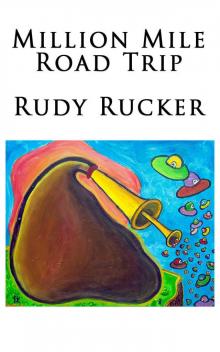 Million Mile Road Trip
Million Mile Road Trip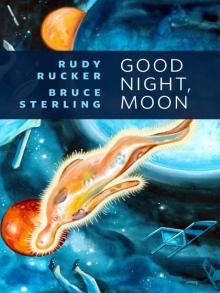 Good Night, Moon
Good Night, Moon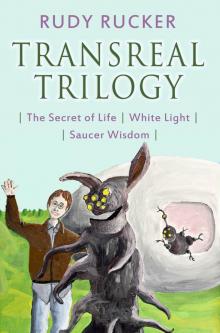 Transreal Trilogy: Secret of Life, White Light, Saucer Wisdom
Transreal Trilogy: Secret of Life, White Light, Saucer Wisdom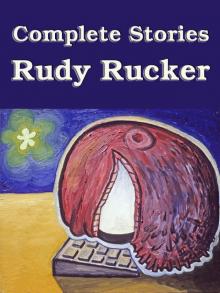 Complete Stories
Complete Stories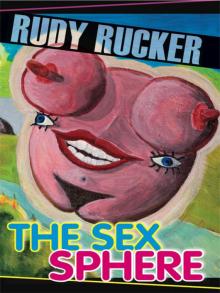 The Sex Sphere
The Sex Sphere Surfing the Gnarl
Surfing the Gnarl Software
Software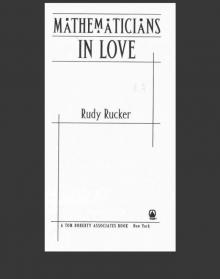 Mathematicians in Love
Mathematicians in Love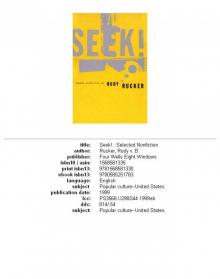 Seek!: Selected Nonfiction
Seek!: Selected Nonfiction The Secret of Life
The Secret of Life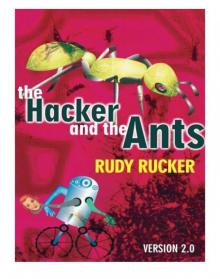 The Hacker and the Ants
The Hacker and the Ants Postsingular
Postsingular Spaceland
Spaceland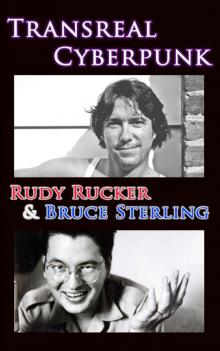 Transreal Cyberpunk
Transreal Cyberpunk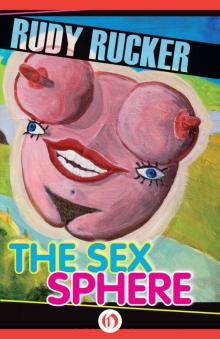 Sex Sphere
Sex Sphere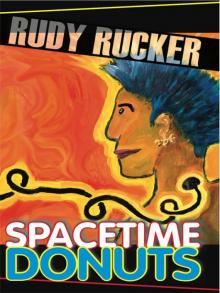 Spacetime Donuts
Spacetime Donuts Freeware
Freeware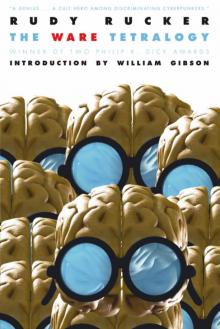 The Ware Tetralogy
The Ware Tetralogy Frek and the Elixir
Frek and the Elixir Junk DNA
Junk DNA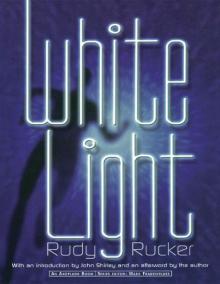 White Light (Axoplasm Books)
White Light (Axoplasm Books)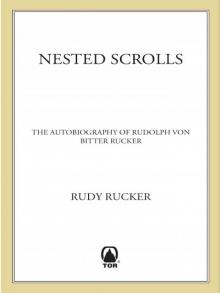 Nested Scrolls
Nested Scrolls Inside Out
Inside Out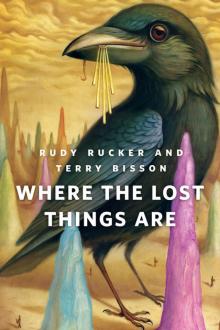 Where the Lost Things Are
Where the Lost Things Are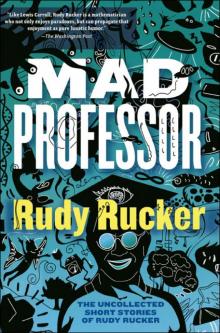 Mad Professor
Mad Professor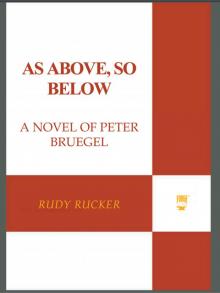 As Above, So Below
As Above, So Below Realware
Realware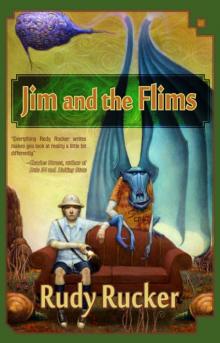 Jim and the Flims
Jim and the Flims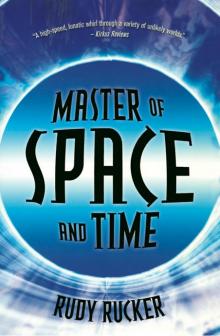 Master of Space and Time
Master of Space and Time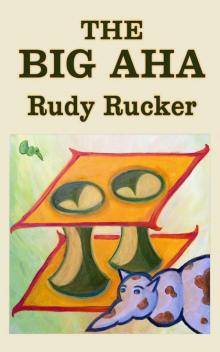 The Big Aha
The Big Aha Hylozoic
Hylozoic